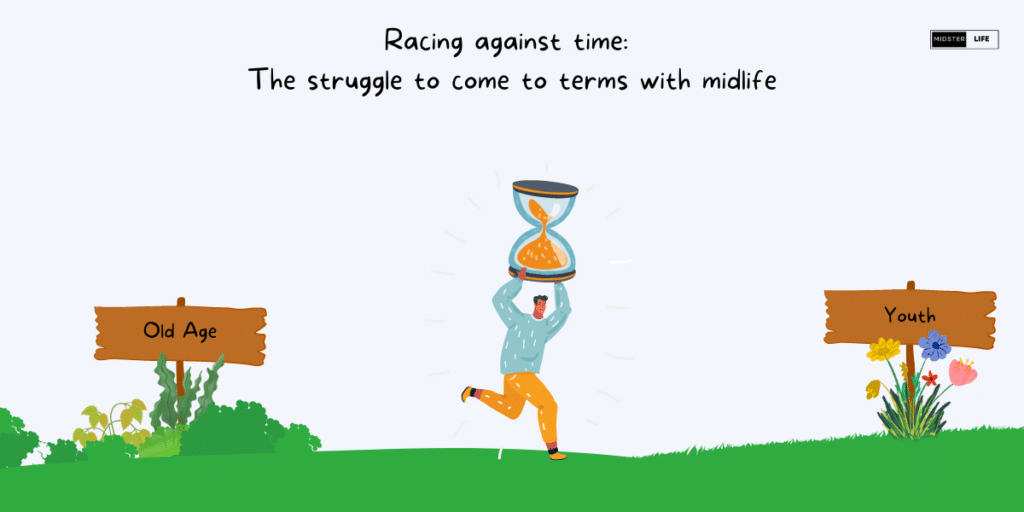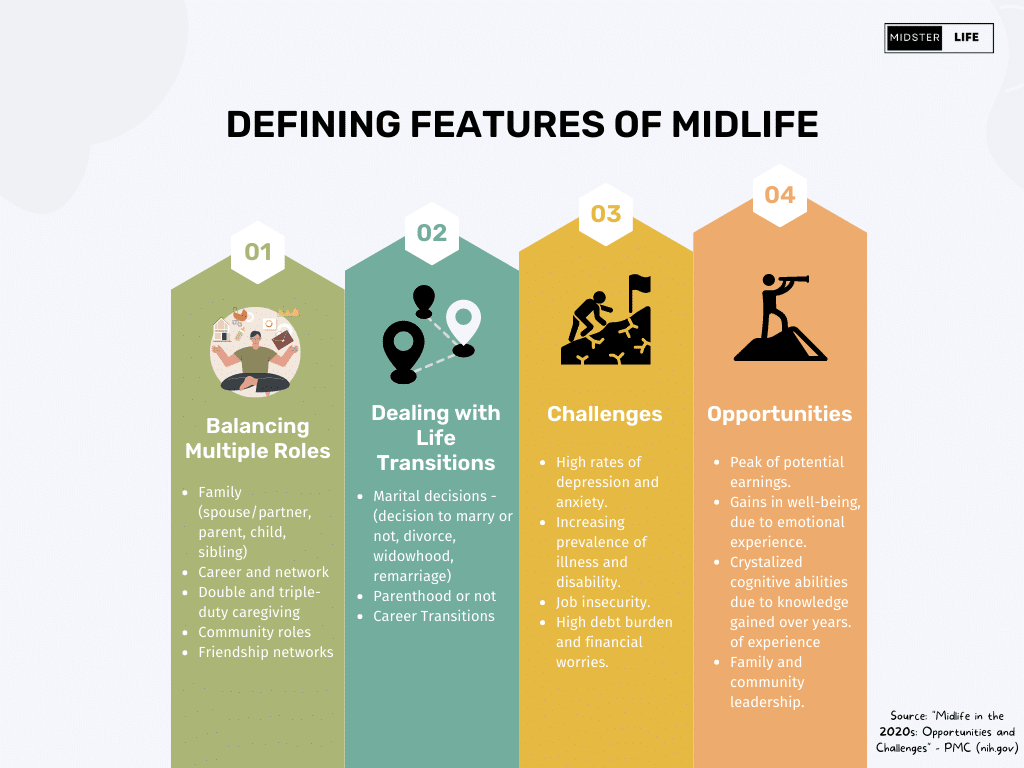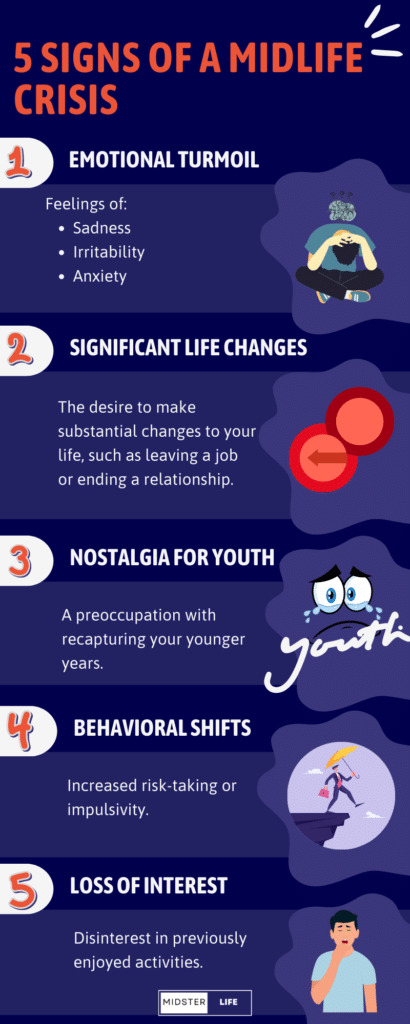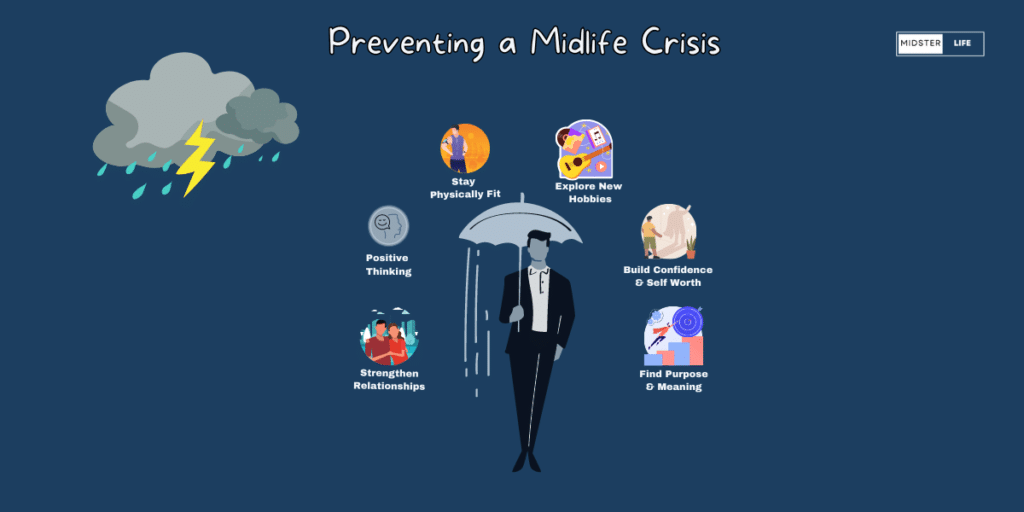How to Prevent a Midlife Crisis in Your 40s: 10 Powerful Tips
Welcome to your 40s, a time when unexpected changes may start to feel enticing—perhaps you’re thinking about quitting your job, overhauling your look, or becoming a fixture at the local gym. You might be asking yourself, “Could this be a midlife crisis?”. If restlessness, nostalgia, or impatience are becoming your frequent companions, it’s possible that you’re inching toward that dreaded midlife upheaval. But fear not, we’re here to explore how to prevent a midlife crisis in your 40s, so you can navigate these transformative years with grace and confidence.
So before you make any hasty decisions (like splurging on that sports car or leather jacket), let’s dive in and explore 10 powerful tips to help you prevent a midlife crisis in your 40s.
Understanding Midlife Crisis

It’s common as you approach midlife to begin to experience a sense of unease or restlessness. Anxiety about aging combined with nostalgia for a long-lost youth can create a period of emotional turmoil known as a midlife crisis.
While it’s normal to feel a sense of loss or regret at this time, there are several steps you can take to prevent a complete crisis.
This post will explore the causes, signs, and ways to prevent a midlife crisis.
What is a Midlife Crisis?
A midlife crisis is a period of emotional turmoil that many people experience in their 40s and 50s. It is a time when you may begin to question your life choices and feel a sense of dissatisfaction or regret.
According to a study published in Economica (2022), a midlife crisis is something that affects both men and women. The study found that midlife is when people disproportionally take their own lives, have trouble sleeping, and feel overwhelmed in their workplace.
Various factors can trigger these feelings, so let’s dive into some common causes of a midlife crisis.
Causes of a Midlife Crisis
According to research published in the journal American Psychologist, there are several critical defining features of midlife:

What is clear is that balancing multiple roles across family, work, and the wider community increases pressure on those in midlife.
We also see the impact of significant life transitions in this period. People experience relationship changes such as divorce, remarrying, parenthood, and career transitions, either by choice or not.
But there are also many other potential triggers, including:
- Job loss or dissatisfaction with your career path
- Changes in your physical abilities or appearance
- Regrets about past decisions or missed opportunities
- Feelings of boredom or dissatisfaction with your current lifestyle
- Health scares/concerns
- Death or illness of a loved one
It’s important to note that a midlife crisis is not a one-size-fits-all experience. Everyone’s journey is unique, and your triggers and experiences may differ from someone else’s.
Signs of a Midlife Crisis

A midlife crisis can manifest in a variety of ways. Some common signs include:
- Emotional turmoil: Studies indicate that individuals undergoing a midlife crisis may experience sadness, irritability, or anxiety.
- Significant life changes: Other research indicates that a desire to make substantial changes to your life, such as leaving a job or ending a relationship, may indicate a midlife crisis.
- Nostalgia for youth: A preoccupation with recapturing your younger years could signify a midlife crisis.
- Behavioral shifts: Increased risk-taking or impulsivity might be midlife crisis symptoms.
- Loss of interest: Disinterest in previously enjoyed activities could signal a midlife crisis.
If you experience any of these signs that negatively affect your well-being and relationships, it is crucial to seek professional help. Engaging with a qualified psychotherapist can assist you in addressing your emotions and developing coping strategies for navigating a midlife crisis.
Although a midlife crisis can be a challenging experience, there is also evidence that it may be a period of growth, transformation, and newfound opportunities. By understanding the causes and signs of a midlife crisis, you can proactively prevent its onset and continue to find joy and fulfillment as you age.
How to Prevent a Midlife Crisis in Your 40s

A midlife crisis can be stressful and uncertain, leaving you feeling lost and confused. However, there are several steps you can take to prevent a midlife crisis from happening in the first place.
Here are some key strategies to help you maintain your happiness and well-being as you navigate through your 40s:
Maintaining a Positive Outlook
One of the most important things you can do to prevent a midlife crisis is to maintain a positive outlook. This means focusing on the good things in your life and showing gratitude for what you have.
Try to express appreciation for the people and experiences that bring you joy. At first, this can be difficult. I know from experience that it’s hard to be grateful when feeling lost.
What worked for me was to start small. The smaller, the better. Be grateful for that first coffee in the morning, the hugs with your kids, or even your walk to work. Keep it simple. You’ll probably be surprised by all the little things that bring you joy daily.
Setting Goals and Priorities
Having goals and priorities gives us direction, especially during stress and uncertainty. The research shows that personal goals consistent with our values and interests can increase life satisfaction and reduce anxiety.
Reflect on what matters most to you and what you want to achieve. Then, set specific, achievable goals that align with your values and priorities. Start by breaking down your goals into smaller, less daunting steps that inspire action.
For example, when I was looking to make a career change and leave my job, I started by regularly attending some career coaching workshops and talks. These smaller steps were less scary and helped me build my confidence without taking unnecessary risks.
Taking Care of Your Physical Health
Physical health is essential to overall well-being and becomes even more critical as we age. But it can be challenging to find time for exercise with the wide range of responsibilities and pressures of middle age.
When you’re busy and have others to care for, it can be easy to slip into bad habits and routines. Try not to take your health for granted.
Make time for exercise, eat healthily, and get enough sleep to maintain your abilities and reduce health problems that could contribute to a midlife crisis.
Strengthening Relationships
Evidence suggests that relationships provide crucial support and happiness, especially as you age. Individuals who have an extensive social network, enjoy exercising and actively pursue goals live longer, more fulfilling lives.
Take time to nurture your relationships with family, friends, and loved ones. Try to stay connected by scheduling regular phone calls or visits. This will help you feel more connected and supported and can prevent feelings of loneliness and isolation.
Look for opportunities to expand your social network. As we age, it’s common for social groups to shrink as other priorities take over. Your 40s are an excellent opportunity to explore different community or sporting activities that can bring you a sense of belonging.
Exploring New Hobbies and Possibilities
Exploring new hobbies and possibilities is one of the best ways to prevent a midlife crisis. This can help you stay engaged and interested in life, and it can also help you discover new passions and interests. Consider being creative or trying something new, whether it’s a new hobby, sport, or career path.
Finding Purpose and Meaning
As you move through your 40s, finding purpose and meaning in your life is essential. A greater sense of meaning and purpose can support successful aging.
Purpose in life can help you stay motivated and engaged, even during challenging times. Consider volunteering, pursuing a passion project, or finding ways to give back to your community. This will help you feel more connected and fulfilled, which can prevent feelings of restlessness and dissatisfaction.
Building Confidence and Self-Worth
Building confidence and self-worth is essential for preventing a midlife crisis. This means recognizing your strengths and accomplishments and taking steps to build your self-esteem.
By adopting a growth mindset, you can improve your resilience, adaptability, and ability to overcome the challenges of midlife. Implementing growth mindset strategies into your everyday life can boost your confidence and self-esteem.
However, if you’re struggling with negative emotions, consider therapy or counseling to develop skills and strategies for staying positive and resilient.
Navigating a Midlife Crisis with Confidence

Seeking Professional Help
If the weight of your midlife crisis feels overwhelming, don’t hesitate to seek the help of a psychotherapist. They can guide you in exploring your emotions, pinpointing the triggers of your crisis, and developing effective coping strategies. Therapists can also assist you in discovering new opportunities and solutions to your concerns.
Making Lifestyle Changes
A midlife crisis can be a wake-up call, prompting you to make positive adjustments. It might be the perfect time to re-evaluate your career path, explore new hobbies, or enhance your physical abilities.
Adopting a healthier diet, exercising regularly, and practicing gratitude can significantly improve your life satisfaction and mitigate stress.
Finding Support and Community
During a midlife crisis, surrounding yourself with supportive friends and family is crucial. Connecting with others who have faced similar experiences can offer comfort and valuable insights. Participating in a support group or community can help alleviate loneliness and foster a sense of belonging.
Try to appreciate that a midlife crisis is a natural part of the aging process and can present opportunities for growth and self-discovery. By embracing the strategies outlined in this post, you can face the challenges of a midlife crisis with confidence and determination.
Embrace this phase as a chance to reinvent yourself and emerge stronger and more self-aware than ever before.



